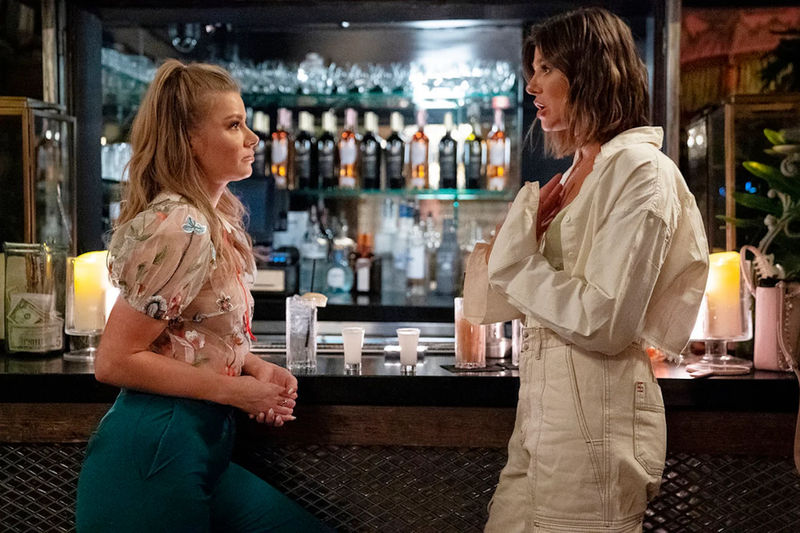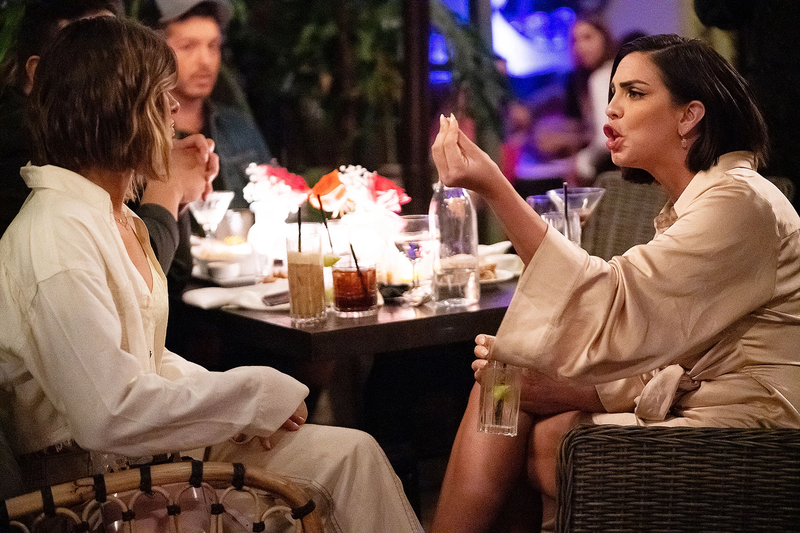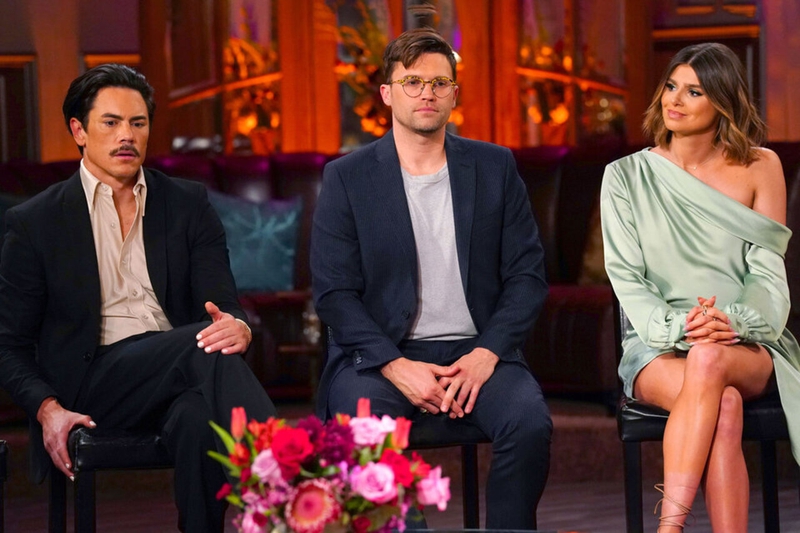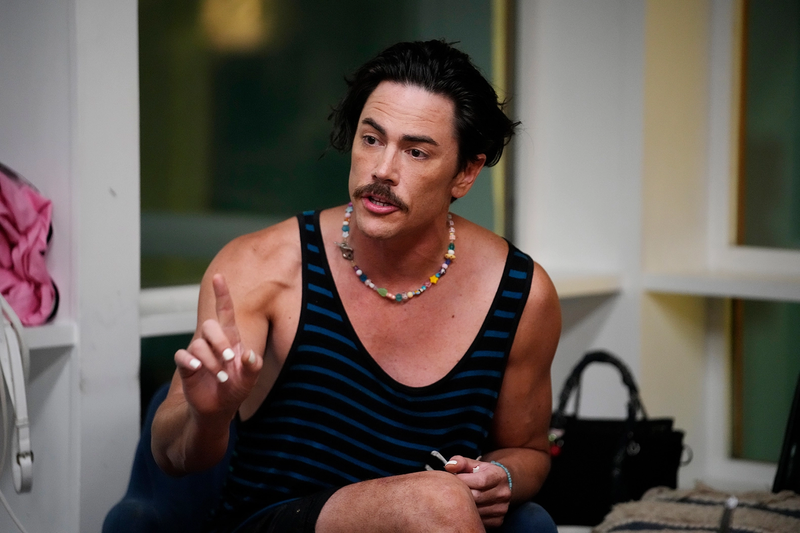Research on horror spectatorship shows that audiences value the genre because it offers a safe container to experience and confront terror, whatever shape it may take. In short, it offers catharsis. Horror spectators understand that there are valuable lessons to be learned about survival and discernment from these stories, that they can instill a way of looking and relating to the world that, in some ways, seems to pierce the veil of existence.
In a world that wants us to bobblehead our way through life like good, happy consumers, horror is disruption, and disruption begets transformation, and transformation is an inevitable (albeit uncomfortable) fact of life. So it tracks that you increase your chances of survival (your capacity to cope) if you teach your nervous system how to stay cozy in chaos.
I've long suspected that certain types of reality TV serve the same function as horror films, particularly the type cornered by Bravo. Like horror, reality TV provides a container of escapism that doubles as a venue for confrontation and projection by its very form. From The Real Housewives franchises to Vanderpump Rules, Southern Charm, Summer House, and Below Deck, cast members don't sign up to participate in a competition, but to make characters of themselves and their conflicts, all of which are "real" and yet still constructed. Fame and opportunity are on the table if by no means guaranteed. What is, however, is bloodshed.
"Bravolebrities" are contemporary gladiators. They battle in coliseums of toxic femininity, toxic dating and work culture, toxic marriages, toxic fandom and media culture. Reunions frequently take on the tone of Celebrity Deathmatch, though they're more often described as akin to the Superbowl. It's cannibal theater through and through, and what this formula means- what it necessitates- is that every now and again, someone gets their guts completely fucking ripped out.
This year, that person was Ariana Madix.

At its start, Vanderpump Rules was unique for the Bravo universe in that its stars were not disgustingly wealthy or pathologically ambitious or even altogether capable of really pretending to be. They were just hot restaurant workers who were profoundly messy in a deeply human way—one that often encroached on the inhuman. And the great thing about the show is that historically, the drama has been emotionally high-stakes with little to no actual stakes.
That changed once Stassi Schroeder and Kristen Doute endangered Faith Stowers's life, and it hasn't stopped changing. If the show's earlier seasons drew comparisons to Friends, the tenth season recalls something more akin to an erotic thriller.
#Scandoval has been hailed as the biggest, darkest scandal in Bravo's history, and though I don't necessarily agree with this evaluation (Taylor Armstrong's husband committed suicide after his domestic violence was revealed on camera; Erika Girardi's lifestyle was funded by money stolen from victims of corporate malfeasance), I understand why one would claim it is. When the news broke that Tom Sandoval had cheated on Ariana, his partner of a decade- with whom he shares a home, in their home, with close friend Rachel Leviss (i.e. "Raquel," DJ James Kennedy's fledgling "bambi-eyed" former fiance who Ariana and Scheana Shay basically adopted after their breakup) over at least seven months, and that the affair had been conducted while they were filming the season currently airing- the story seemed to expand and balloon like The Blob itself, consuming everything and everyone in its path, each new detail more jaw-dropping, more blood-curdling than the last. And it's true, the details are heinous.

While some claim to enjoy these shows for the petty drama and light shade, in truth, interest in the spectacle tends to spike the moment they tip into "horror reality," by which I mean the dramas in life that aren't petty at all; encounters that materially tear your world and how you comprehend it inside out and upside down. As Ariana herself described in an interview with Glamour, "It was like the air was sucked out of my lungs."
Ariana has always been the least villainous in a cast where no one claims to be pure as the driven snow. A third-season addition, she came on as best friend and ally to Scheana and third party-foil to Kristen in her and Sandoval's disaster of a relationship. Ariana was the quintessential "Cool Girl" as articulated by Gillian Flynn, and her most frequent role has not just been the Voice of Reason, but the bridge between warring factions. In hindsight, it's easy to see that one of those factions was always heralded by her now-ex. Though she was always trying to be the peacemaker, Ariana was- as she once told former co-star Brittany- "married to the problem." And like the classic Final Girls of '70s and '80s slashers, she's easy to root for because she's about as moral a victim as they come.
Because the affair haunts the season, our awareness of the dark secret rotting beneath the floorboards makes it all so compelling. As cast members and viewers alike have attested, had we not known, this seasnon's events would have been interpreted very differently—a tension that is both a defining feature of the Gothic and the subject of countless horror films. But the affair isn't the only thing haunting the season.
There's also the specter of Randall Emmett, disgraced producer, former fiance, and baby daddy of Lala Kent. While he obviously doesn't appear, mention of his LA Times-documented history of predation, abuse, and corruption is unavoidable, as is the legal action involved in their ongoing custody battle for daughter, Ocean. Much like the uncovering of Emmett's infidelity (the least of his crimes, it seems), details of Sandoval, Rachel, and Tom Schwartz's deception were revealed by fans with literal receipts. And just like Emmett, they each seem most preoccupied with deflection and the narrative.

The villainy on display has inspired millions of viewing hours and even more words, not to mention an audience with a vigilant dedication to the pursuit of truth once it became clear that the season's main arc was a falsified narrative. Like the detective in a nineteenth-century Gothic serial, viewers gathered evidence and studied testimony to suss out the unreliable narrators.
Terror has always been found in the family home. The horrors of marriage and of the nuclear family as legal institutions have been a defining theme of Gothic literature since the eighteenth century, and this season of VPR has that in spades. Off the show, Lala has described a violent confrontation with Emmett that led her to flee his Bel Air home under cover of night. On the show, recently divorced Katie and Schwartz are pitted against one another and sacrificed to the lie of the affair: Schwartz, as a decoy (whether he was cognizant or not), and Katie, who was emotionally terrorized, unjustly vilified, and rendered collateral damage in the charade.

Meanwhile, one of the ickier details regarding the affair was that it was conducted in the home Ariana and Sandoval still share. Why have neither of them left, you might ask?
In season nine, we see a conversation between Ariana and Lisa Vanderpump where she talks about her and Sandoval's plan to refinance their home and the loan Tom takes out against it to invest in his restaurant, Schwartz & Sandy's. While she emphasizes that the loan is only against his equity, she also co-signed it, meaning she assumed liability for his debt. Leveraged to the gills and hemorrhaging money on his cover band, there's no world in which Sandoval can afford to buy her out, and so Ariana remains trapped in their haunted home so long as she wants to see her money back. He didn't just fuck her friend, he threatened her entire financial future.
Of course, endorsements from the likes of SoFi, Lays, Bic, Bloomingdales, Uber, and Duracell have transformed the financial blow into a lucky windfall, not to mention the merch that's helped fund her and Katie's forthcoming sandwich shop, Something About Her. Ariana may have gotten her guts torn out, but she's being paid handsomely for the spectacle of it. Grotesque as it may be that her grief should turn a profit, such is the condition of capitalism.
Nevertheless, experiences of major betrayal are a trauma, and like all trauma, they literally rewire your brain's chemistry and worldview. The scope of fear widens, and all kinds of beasties emerge from the negative space of what you don't know. Anything becomes possible, but that anything isn't shaped by the positivity of limitless possibility—only the terror of it. If someone can claim they love you and pretend to love you but lie and deceive and manipulate you like that, what the fuck is love? Is everyone lying, deceiving, manipulating, and mindfucking you all the time? How do you know? How do you protect yourself?
These tensions essentialize the horror of romance. They're also the tensions each of the women of Vanderpump Rules face in their own ways. Ariana, obviously, but also Lala with regard to Emmett; Katie, as she moves on from Schwartz, her biggest hater; Scheana, whose unmitigated generosity bit her in the ass once again when Rachel slapped her with a frivolous restraining order. And Rachel herself.
Here's the thing: Sandoval is "dangerous" as Lala attests, but his villainy is transparent and borderline mundane—a character we've seen a million times before, who most of us encounter in our daily lives. Much of what was truly terrifying about the season (and even more so since the reunion) is Rachel: the depth of her duplicitousness, what's betrayed about her interiority in the incongruity of how she perceives others, the distance between reality and how she interprets it.
On the show, we see her sustain herself on the most poisonous forms of validation—those that come at the expense of others. And we've seen how she becomes dangerous to every woman she comes in contact with, not because she'll "steal their man" but because she's a cannibal. In constant competition, she eats her own, and when there's no one left, she'll eat herself.
Which is not to say she isn't sympathetic.
Rachel is a rendition of the monstrous feminine born of perpetual infantilization and an environment- pageantry- that pits girls and women against each other. She's a villain, but she's also a victim, just not in the way she thinks she is.
If the reunion revealed anything, it's the degree to which Sandoval fabricated an alternate parallel universe for them both to exist in, one that no amount of spin or semantics could make seem real because of how untethered it was from reality. Except for Rachel, it was real. Like Schwartz, she seems to possess an extraordinary capacity to filter information that doesn't support her desired outcome. And at least at the point of the reunion taping, it didn't seem like she'd yet come back to earth—then again, gaslighting does tend to confuse things.

The season's arc has seen Ariana, Katie, and Lala unmask the masked killer and escape (at least emotionally, spiritually) their respective haunted houses. Rachel's still trapped inside, but the haunted house is herself. After all, women being driven to madness and unraveling onscreen is also a recurring Gothic horror motif. All monsters are born of tragedy. Why should she be any different?
Since the reunion aired and the audience bore witness to Ariana's rage and disgust, the tide has (predictably) turned. Accused of "bullying" Rachel and threatening her mental health, Ariana's completely legitimate anger is pathologized, foreshadowing the point that will inevitably come where she'll be called to forgive and move on lest she become the villain. Already Schwartz is quoting Nietzsche on Jax and Brittany's podcast, "beware that when fighting monsters, you yourself do not become a monster" (a sentiment he should probably consider about himself).
It's the language of horror that's been used again and again to describe this season because what unfolded on our screens was horrific to watch. Was it the most horrific thing happening in the world over the last three months? Far from it. But all day, every day, we witness people betray the humanity of others in depraved, unconscionable ways while telling themselves stories about how good and righteous they are—how it's all for love.
Gothic horror exposes the teeming underbelly of things, and the dissection of that exposure is what the tenth season of Vanderpump Rules has been all about: a safe space (for viewers at least) to confront the truth of how terrifying, how inhuman people can really be.






